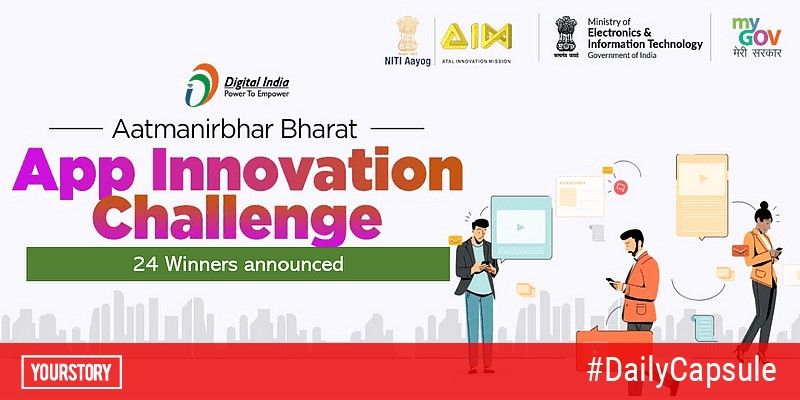The Faking News Story: Rahul Roushan
Thursday October 06, 2011 , 9 min Read

Everybody Lies.Cops lie. Lawyers lie. Witnesses lie. Even victims lie.
But when Michael Connelly wrote the above lines as a sensational opener of his world-acclaimed novel- least did he know, that every lie when enveloped in humour and satire can take ‘the art of writing’ to a different level all-together.
In an exclusive interview with YourStory.in, Abhilasha Dafria discovers the true story of the popular ‘paagal patrakar’, Rahul Roushan, founder and brainwave behind the supreme spoof website “Faking News”.
Lets ironically open this conversation with a little truth about the man behind “The Faking News”.
I’m primarily a media guy who has studied Maths (B.Sc.), Journalism (PG Diploma), and Management (MBA), and has worked as a television journalist for around 3 years pre-MBA. Post-MBA, I’ve been doing various things – freelance consulting to earn livelihood and more than a couple of attempts at getting a media startup going, which included a television channel (only success was attracting interests of a couple of well-known VC funds), a gaming website (excellent launch but now sold off), and a PR firm (I failed miserably though my partner continues with it).
Tell us more about Faking News.
My website Faking News, is something that I didn’t exactly start as any “startup”; my desire to explore and hone my writing skills made me start this blog even though I booked a custom domain name from day one. Since I booked a “.com” domain name (on blogger platform), I guess somewhere at the back of my mind I had some “commercial” thoughts about it, but frankly, I had no growth or monetization plans when I started writing anonymously, and I was just happy blogging for the next one year.
But yeah, today I treat Faking News as startup, and it’s no longer just blogging for me. I haven’t taken any consulting assignments or freelance projects for over a year now and I’ve been devoting all my time to Faking news.
For those who are still wondering, Faking News is a news satire website that publishes imaginary news reports, which are often a spin/comment on the news being discussed/reported in the mainstream media at that point of time. Apart from satirical take on current issues, Faking News also publishes news reports that satirize elements of our daily life.
So how did you come up with this idea and the name?
Well, the idea of “news satire” has existed for more than 100 years and I can’t claim that one fine day this idea struck me. But yeah, one fine day, on 15th September 2008, I decided to try my hands at writing news satire.
Funnily, while I was a journalist (writing non-satirical news), I was hardly interested in “news satire” genre of writing, but I got drawn to it during my MBA days. I started wondering why India didn’t have something like “The Onion” even though we were more “newsy” nation than the USA. It was also not so that satire was alien to India, as we have some outstanding writers of satire, especially in vernacular languages (HarishankarParsai, ShrilalShukla, Sharad Joshi among others in Hindi whom I know).
Somehow I felt that “news satire” could work in India, especially in an era when television news channels were being accused of dumbing down news reporting. And I thought about blogging in this style to gauge the response, and I was not wrong I think.
And it was due to television news channels that I thought about the name “Faking News”, which is a satirical take on the overused and abused term “Breaking News” by the 24-hours TV channels.
Did you always intend to create something this big or did you take it in the course of time?
I didn’t have any grand plans when I started blogging. I had even stopped writing during IPL-2 (coincidentally when another anonymous blog of “Fake IPL player” became hugely popular) as I was busy operating a gaming website (not the one I mentioned earlier) for IPL-2; it was a commissioned project for a news channel.
Even though I wrote just 2 or 3 articles (fake news stories) in those two months (April-May 2009) during IPL-2, I could still see some traffic coming in and I assumed that there were people who liked the idea of news satire and wanted me to continue writing. And I decided to resume blogging.
And in August 2009, I decided to shift to a self-hosted WordPress platform and gave the blog the current look and feel. As popularity and traffic grew, I decided to devote more and more time to this, and for over a year now this has become my fulltime job.
What hitches and hurdles did you face during the early days of Faking News? Could you tell us a little about your initial challenges?
Well, in my case, I’m running a content based website, and the biggest hurdle of course is to generate content on a regular basis without compromising on quality. Since it is original and creative (sorry to sound like a narcissist) content that I have to produce, the challenge is even greater.
Although I accept contributions, almost 80% of the articles are written by me. This takes a substantial amount of time and makes other aspects like “marketing” and “selling” even more challenging, as I hardly have time left for them. Yes, Faking News is virtually a one-man team (not an ideal situation of course for any startup).
In terms of marketing, I don’t really have to try too hard as a good piece of content is itself is the biggest marketing tool. Faking News has grown because some of the articles went viral, with around 3 of them being mistaken as true news and reported by different websites as real event.
Twitter and Facebook of course are the biggest marketing tools as they help you keep connected. Internet is hugely cluttered and it’s very important to be connected with your readers, else there could be “out of sight, out of mind” effect.
But the biggest challenge for a content based website is “selling”. You can’t get first party ads easily without becoming a “big publisher”. If you are a content website with modest reach, you have to depend upon ad-networks for ad-revenues and you may not get the best deal from them.
I’ve been toying with other ideas of revenue generation like merchandising or events, but lack of time (and skills too, to be honest) has not yet allowed it to happen.
Are you looking at hiring writers?
There have been many guest contributors who have contributed one-off stories, and around 7-8 regular contributors. I would have loved to form a team with them, but they already have day jobs and I am afraid I can’t provide any better financial alternative to them.
I recently started a Hindi chapter (not translated version of English articles) of Faking News, which is being taken care of by a friend, though he too has a day job. But he is doing a good job and is regular, so it is one-man team each taking care of the English and Hindi websites.
But I do appreciate the fact that one has to involve more people and parties to achieve fast growth, and currently I’m in talks with a few people and organizations.
Does the revenue generated via AdSense help you sustain the business?
Revenue through Google AdSense is decent enough to pay up the bills for (not cheap) web hosting, internet, telephone, and my personal (travel and living) expenses. As I said, I’ve been toying up with ideas to make money through means other than display advertisement, but haven’t executed any of them yet. Also, there have been a couple of instances when I’ve been able to get first-party ads and the rates I could command were handsome.
How many unique visitors visit your site everyday?
Around 10,000 absolutely unique visitors and 45,000 page-views daily.
Are you looking at getting funded now?
Yes, whatever investment I’ve made into this has been through my personal savings. Yes, I’m looking to get funded as I don’t think I can take it to the next level all by myself and through modest investments that I can afford.
Are there other troupes in the market doing similar things? Could you name some of them?
Why would I name my competitors and give them free marketing?! ;) But Faking News is surely not the only one. I later realized that at least two other websites were already operational and writing news-satire when I started blogging, and after Faking News became popular, dozens have come up. Some of them are doing well. If you force me to name one player doing similar thing, I’d say – India TV.
So what is your USP?
Guess my ability to come up with something relevant on a current issue that is not touched upon by the mainstream news media.
How do you define the Indian blogging scenario? Do you see monetary potential therein?
There are professional bloggers and they are making good money, but right now I can think of only one – Amit Agarwal of Digital Inspiration. There is definitely monetary potential but I don’t think Indian blogging scenario is driven by that.
What were your highs and lows? And most importantly, what are your greatest challenges and how do you plan and prepare to muddle through them?
The fact that I’ve been able to take Faking News to this level all by myself is of course the biggest high, and the low is my inability to get formal team going around the website – and that’s my greatest challenge right now – to make take Faking News to a higher level, with the help of a professional team.
Where and how do you see yourself going ‘bout this? Do you plan to further diversify the content?
Yes, I’d like to see more diverse content on Faking News, with more audio-visual content. I’d like to see the brand getting bigger and reaching a larger audience.
And finally- any vital tips you’d share for budding bloggers of the country?
Content is the King – the age old adage holds true. Focus on that and the rest will follow. But don’t reject “marketing” and “selling” as dirty words.
What are you waiting for? Have some fun here http://www.fakingnews.com/










